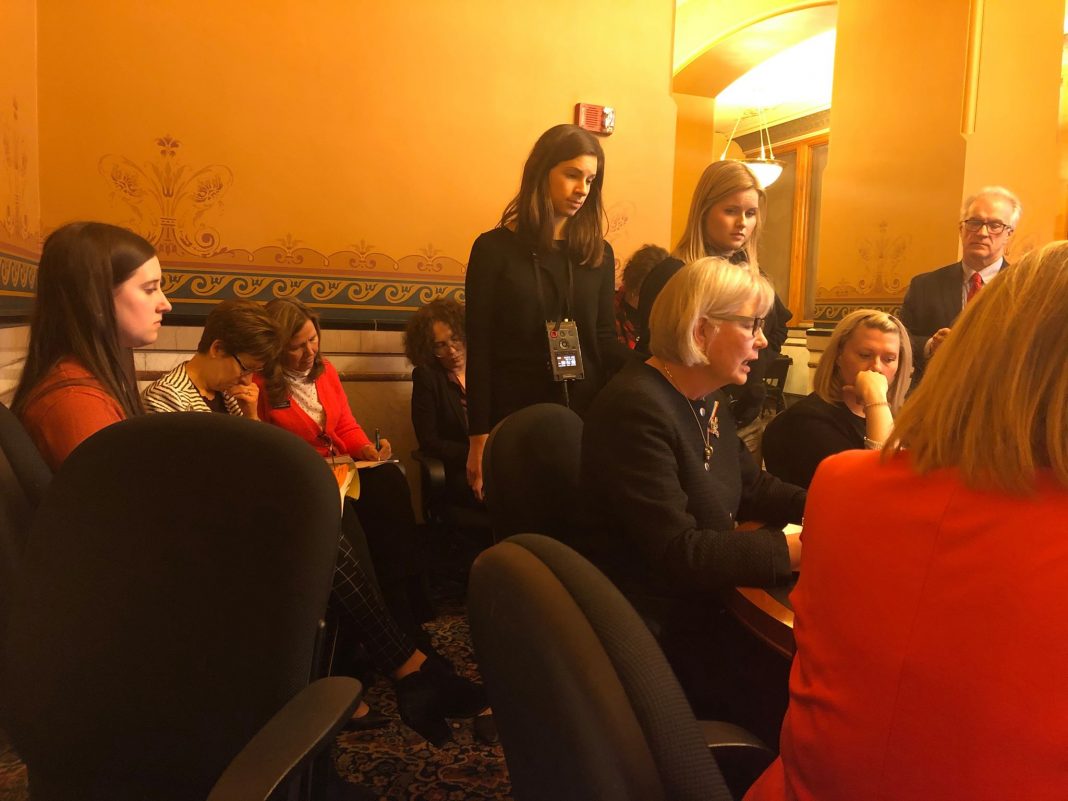FRUSTRATED WITH FAKE NEWS? THIS IS YOUR CHANCE TO DO SOMETHING ABOUT IT!
If you are someone who believes the media refuses to give a fair shake and just report the facts, then consider supporting The Iowa Standard.
The Iowa Standard is a free online news source so we can reach as many people as possible. But we need to raise money! We are asking our readers to help support us as a news alternative entering 2020. If you could, please consider showing a sign of support to The Iowa Standard by making a contribution here. Or, you can use Venmo and make a contribution to @Iowa-Standard-2018.
You could also send a check to:
PO Box 112
Sioux Center, IA 51250
Thursday’s subcommittee on House Study Bill 672 centered around providing information to patients. The bill relates to informed consent for medication abortions.
It requires a private office, freestanding outpatient surgical facility, hospital or other facility in which medication abortions are performed to conspicuously post a sign in a location as described in the bill relating to the effectiveness and possibility of avoiding, ceasing or even reversing the effects of a medication abortion.
Unless it’s a medical emergency, a physician shall not perform or attempt to perform a medication abortion unless there is written certification from the pregnant woman. That written certification shall provide the woman has been informed, by telephone or in-person, prior to the medication abortion, of all the risks commonly associated with a medication abortion and that it may be possible to reverse the intended effects if the woman changes her mind.
The Iowa Department of Public Health would be required to publish and make available on its website materials designed to inform a woman of the possibility of reversing the effects of a medication abortion should she change her mind.
Those who testified at the House subcommittee were split on the bill.
Laura Hessburg of the Iowa Coalition Against Domestic Violence testified in opposition.
“It’s misguided to think women need the protections provided by this legislation,” she said. “To imply doctors force women to have abortions against their bill, this bill suggests we don’t trust women to make decisions for themselves and don’t trust Iowa doctors to provide information.”
Hessburg said reproductive coercion is a key element of domestic violence and occurs when a male partner uses threats, intimidation or violence to impose his will on a mother.
“Women denied access to abortion care often return to an abusive relationship,” she said. “For those seeking an abortion, medication abortion has been an especially important option. Requiring doctors to violate their medical training is a new low. Please reject this bill.”
Jamie Burch Elliott of Planned Parenthood Advocates of Iowa and Planned Parenthood North Central States said the bill is “medically unethical” and requires a doctor to provide misinformation to a patient.
“Quite frankly, it inserts government into peoples’ personal medical conditions,” she said. “At Planned Parenthood, we ensure all of our patients receive accurate information about all of their options so that they can make their own fully informed decisions about their health, their family and their future. By suggesting there’s a way to reverse a medication abortion, our physicians would be undermining the informed consent program process which should instead stress to patients to be certain before proceeding to the first step of the medication process.”
The idea that medication abortions can be reversed is promoted by opponents of safe and legal abortion, Elliott said.
“What is not safe is for those opposed to abortion to provide or push false or unproven claims about abortion not based on medical or scientific evidence,” she said. “Abortion reversal bills are dangerous mandates not supported by science or medicine.”
Amy Campbell of the Iowa Coalition Against Sexual Assault said the group is concerned about what this might do for victims of trauma, rape or sexual assault.
“We want to make sure that they have accurate information,” Campbell said. “That they make those decisions based on information from their physician. We want to make sure that information is entirely correct. We don’t want to impose further trauma or confusion on a victim of rape.”
Karla Fultz McHenry represents the Iowa Independent Physician Group, which includes OB/GYNs. They too oppose the legislation.
“I don’t want to see our physicians put into a position to give inaccurate information on a sign or otherwise that hurts their ethical and standard of medical practice,” she said.
Connie Ryan of the Interfaith Alliance Fund of Iowa said it is one more attack on women’s reproductive rights, just a different angle of doing it.
Danny Carroll testified in support of the bill on behalf of The FAMiLY Leader.
“This bill itself seems very reasonable,” he said. “It provides some meaningful information about the risks of taking medicine to terminate a pregnancy, what options there might be for reversal and how do you access those options.”
Carroll said lost in the debate are the women who are hit hard by reality.
“She’s already been through a lot,” he said. “From a pregnancy, she really hadn’t intended or planned for, then to have to come to the conclusion that abortion is the only answer and then to show up and begin that process, take the medication and then reality hits. Finally, it’s become real. It’s no longer a political discussion or moral dilemma. There’s nobody else there, just her and reality. It seems reasonable to me that she at least know it can be reversed. It’s not too late.”
Tom Chapman of the Iowa Catholic Conference supports the bill, noting it has nothing to do with access to abortion and instead assume there is access to abortion.
“Women considering abortion deserve to have information about the abortion procedure, possible consequences, development of the unborn child and services available as an alternative,” he said.
Maggie DeWitte of Iowans for LIFE said information provided by the legislation doesn’t interfere with anyone’s ability to choose an abortion.
“The bill simply requires that women who are faced with an unplanned pregnancy know there is another choice available if they decide to have a medication abortion and after then decide choose they don’t want to continue,” she said.
Theresa Welch of InnerVision HealthCare was the lone medical professional at the subcommittee. Welch has been a registered nurse for 26 years. She said InnerVisions HealthCare is a free, local clinic that serves women with unplanned pregnancies and STDs.
“We are radically committed to helping inform women of all of their options, including medical risks and side effects of their decision to have an abortion,” Welch said. “I am fiercely pro-woman and feel women deserve the right to be empowered to make a fully informed decision on sexual reproductive options before making a particular choice.”
Welch said it is medically and ethically responsible to notify pregnant patients of both the procedures and risks associated with medication abortion before using abortion-inducing drugs.
Recent research indicates success in reversing abortion medication.
“Are patients who have initiated the abortion procedure aware that the possibility of this reversal exists,” Welch asked. “If not, they should be as it is their right to be medically informed and we in the medical community have a duty to share that information.”
That research indicates the reversal medication has a higher rate of effectiveness to reverse the effects of an abortion-inducing drug within the first 24-48 hours after the patient takes the first pill.
“The medical community often forgets whom we’re serving,” Welch said. “We don’t just treat or heal patients with identification numbers, we heal actual people. Decisions have consequences. This issue touches at the heart of what it means to be human and humans sometimes change their minds. Let’s give women the choice to change their mind. I would rather error on the side of overinforming than on the side of underinforming.”
Rep. Beth Wessel-Kroeschell (D-Ames) said when she’s uncomfortable with something a physician has recommended, she seeks out a second opinion from a physician.
“I don’t go to the legislature,” she said. “I don’t come here and say, ‘say, I wonder how I should treat my medical condition.’ And that’s what we’re doing here. I’m not a medical doctor, I do play one here often, but I’m not.”
She then blasted the legislation.
“This bill essentially is requiring, in my opinion, a physician to lie to their patient,” Wessel-Kroeschellsaid. “We’ve gone real low in this legislature. We’ve gotten really low. And this is pathetic. I’ve been on a lot of these committees, but to ask a physician to lie to his patients goes beyond reproach.”
Rep. Joel Fry (R-Osceola) said the subcommittee members were presented with two documents from two different medical groups.
“I’m going to read both of them, but I have a hunch they’re going to disagree,” he said. “To suggest that we’re somehow lying to patients, I’d have issue with that Rep. Wessel-Kroeschell. I believe we have medical information that is contradicting each other right in front of us.”
Rep. Shannon Lundgren (R-Peosta) chaired the subcommittee.
“I heard a lot of things today,” she said. “Required information to women denies care, erects barriers and gets misinformation. I honestly sit here and cannot believe that anyone would say it is wrong to give a woman information in regards to her health care, especially people in this room who seem to care so much about women’s health care.”
Lundgren agreed with Rep. Frye, noting two documents contradict each other.
“We certainly have to take a look at all of that information, however, information to people is not a bad thing,” she said. “Any woman that’s placed in a situation where she is faced with this decision should have every ounce of information available to her to make the right decision and, if possible, to change her mind should she go home and choose to do so.
“I do take issue with anyone saying that this information would keep sexual assault victims from seeking help. We’re not talking about any of that in this bill. We’re talking about, plain and simple, information being provided to women. And I just can’t believe some of you could stand here and say that that’s a bad thing.”
Lundgren signed off on the bill as it will be advanced to the House Human Resources Committee.












